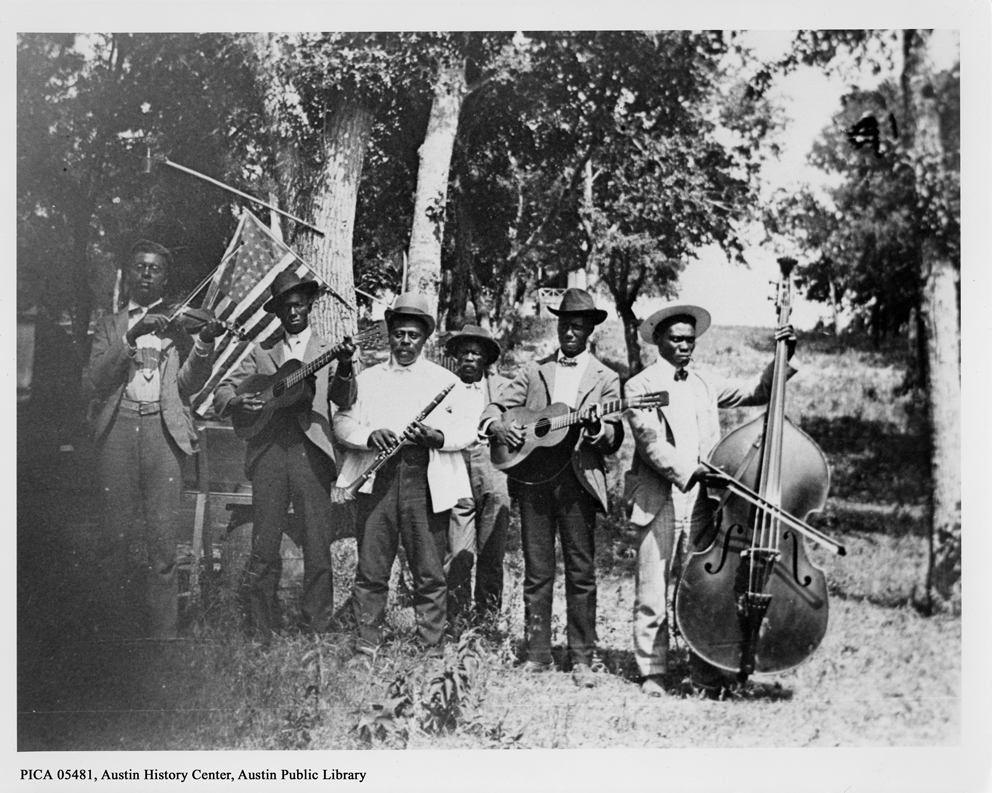By Dhy Edwardsberry, business librarian, Goizueta Business Library.

Emancipation Day Celebration Band, June 19, 1900. Credit: Austin History Center, Austin Public Library
The date was June 19, 1865. Union soldiers led by Major General Gordon Granger entered Galveston, Texas to read General Orders No. 3 which stated, “The people of Texas are informed that, in accordance with a proclamation from the Executive of the United States, all slaves are free.” The Emancipation Proclamation took effect on January 1, 1863, but it did not free all enslaved people. It only freed enslaved people in “Confederate control and not to slave-holding border states or rebel areas already under Union control”; however, it took over two years for the news to reach the ears of the enslaved Blacks of Galveston that they were freed people.
The first Juneteenth, or Freedom Day, was celebrated in 1866 in Texas. The day was filled with religious festivities, music, barbecues, celebration, and reflection on the pain of 246 years of enslavement. As Black folk migrated from Texas to other parts of the South, the traditions of the holiday were brought along with them. Juneteenth signifies the beginning of civil rights for African Americans in the United States. However, civil rights progress has been incredibly sluggish in the history of this country. After 156 years of “freedom,” African Americans continue to battle issues of disenfranchisement from systemic racism, unequal educational facilities, mass incarceration, police brutality, and socioeconomic disparities.
Today, Juneteenth is the considered the longest running African American holiday in the United States. In 1979, Texas became the first state to recognize Juneteenth as an official holiday. On June 17, 2021, President Biden signed the Juneteenth National Independence Day Act into law officially making the day a public holiday. This year’s holiday will be observed on Friday, June 18th since the day of the holiday falls on Saturday. As this year’s Juneteenth approaches, I reflect on the past of civil rights in this country, particularly on the brutal police killings of BREONNA TAYLOR, GEORGE FLOYD, DUANTE WRIGHT, RAYSHARD BROOKS, DANIEL PRUDE, FREDDIE GRAY, ERIC GARNER, TRAYVON MARTIN, MICHAEL BROWN, SANDRA BLAND, TAMIR RICE, ALTON STERLING, PHILANDO CASTILE, BOTHAM JEAN, JANISHA FONVILLE, and many, many, many more African Americans. I wonder what actions all Americans, particularly white people/non-people of color, will take to implement positive civil rights changes and help end these disparities that have plagued our country since its inception—the onus is not on Black people to do the heavy lifting. I’m hopeful for change, but I’m also realistic. As I mentioned before, positive change moves incredibly slowly in this country.
Dhy’s Juneteenth Reading List:
On Juneteenth, Annette Gordon-Reed
The Warmth of Other Suns: The Epic Story of America’s Great Migration, Isabel Wilkerson
Juneteenth : a Novel, Ralph Ellison
Caste: the Origins of Our Discontent, Isabel Wilkerson
I Know Why the Caged Bird Sings, Maya Angelou
The Underground Railroad: a Novel, Colson Whitehead
Stamped from the Beginning : The Definitive History of Racist Ideas in America, Ibram X. Kendi
Also, check out last year’s Juneteenth post from former Emory colleague Chaundria Campos.
Sources:
History.com, What is Juneteenth?
History.com, Emancipation Proclamation
Al Jazeera, Know their names: Black people killed by the police in the US
NPR, Senate Unanimously Approves A Bill To Make Juneteenth A Public Holiday
NPR, House Passes A Bill To Commemorate Juneteenth As A Federal Holiday
